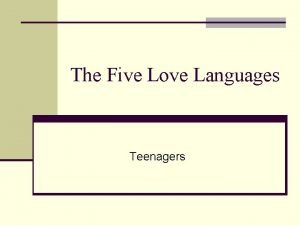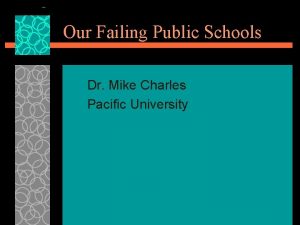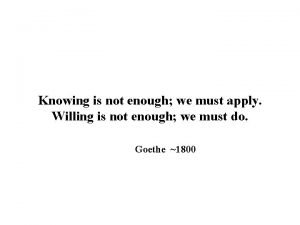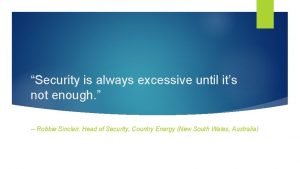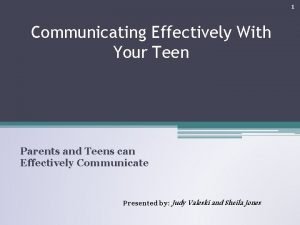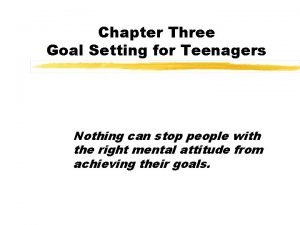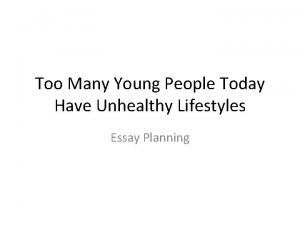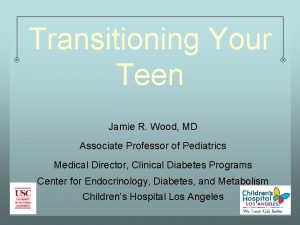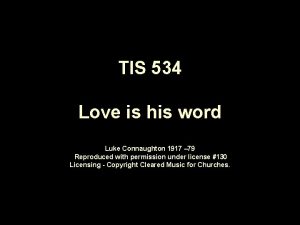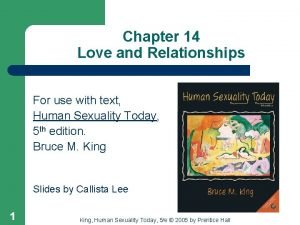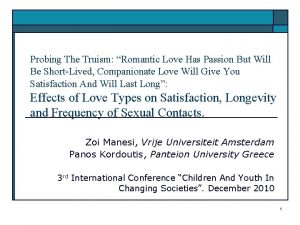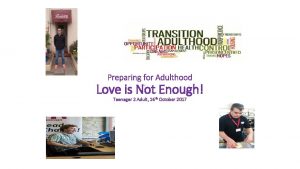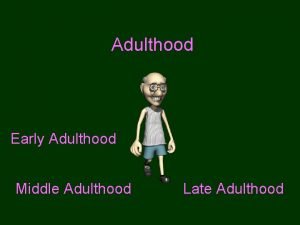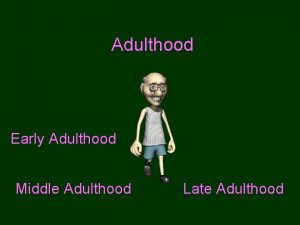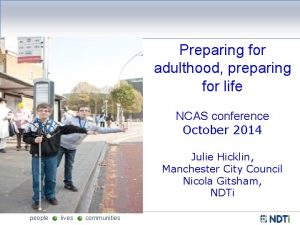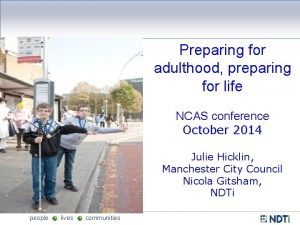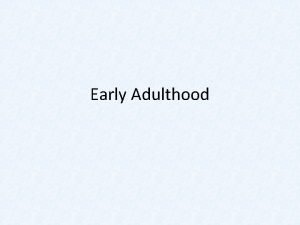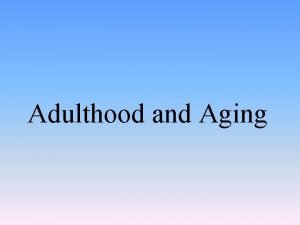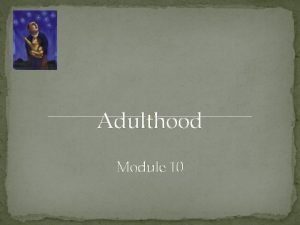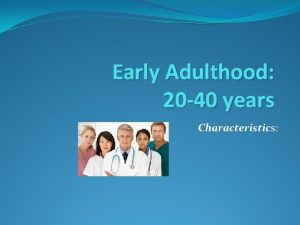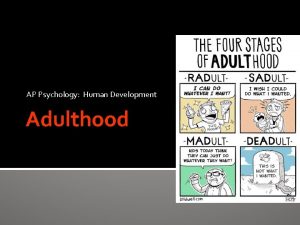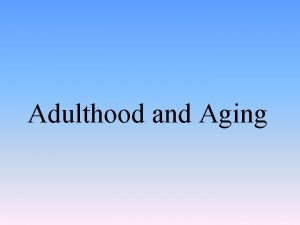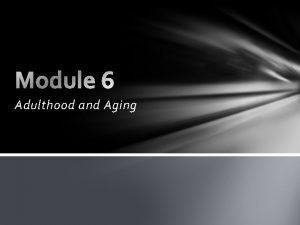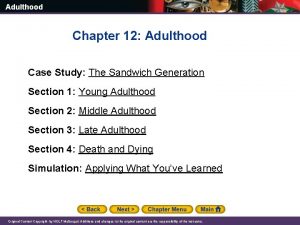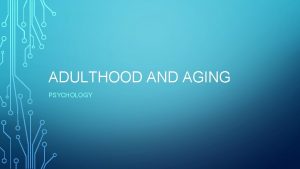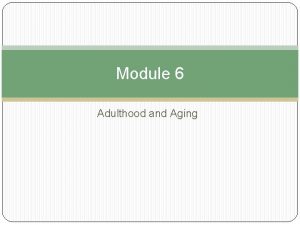Preparing for Adulthood Love is Not Enough Teenager






























- Slides: 30

Preparing for Adulthood Love is Not Enough! Teenager 2 Adult, 16 th October 2018 Elaine Okopski and Claire Eveleigh

IT’S THEIR FUTURE TRANSITION 1. change or passage from one state or stage to another 2. the period of time during which something changes from one state or stage to another (Collins Dictionary)

IT’S THEIR FUTURE What we want Young people with additional needs in Dorset not to ‘transition’ but p grow u in the same way that their mainstream peers grow up, with the same choices. opportunity high expectations Approaching adulthood should be a time of opportunity, excitement and high expectations.

IT’S THEIR FUTURE Why ‘Transition Planning’ matters. • For the Young Person, becoming 18 can mean the loss of valued familiar faces. Moving on from friends, familiar care, paediatric medical & support services, shortbreaks provision and schools and environments where they have felt secure and safe, for many years. • For families, this means negotiating a ‘policy maze’ of different legislation, assessment procedures, funding arrangements, styles of work and benefit entitlements.

IT’S THEIR FUTURE Who may be involved! School/College & SEN Team Children & Adult Social Care Children & Adult Health Services Information, Advice & Guidance Services and Advocacy Services

IT’S THEIR FUTURE Love is not enough Your love for your son or daughter is important but it is not enough to make sure they have a good life. You are not alone in worrying about the future. Start planning early, equip yourself with information and find out about ALL the options. It pays to do your homework! Be prepared so you can actively participate in decision making. Make appropriate choices for young person. REMEMBER, Families ‘transition’ too!

“The years in which a young person is approaching adulthood should be full of opportunity” Care Act Guidance, 2014

When does Preparing for Adulthood start? The answer to this is simple: as early as possible, right from very early childhood. When we read our children stories about farmers/lion tamers/explorers/dancers, when we play doctors and nurses with them or help them to understand how to follow instructions, we are helping to prepare them for a world where they will one day have a job. When we teach our children to feed themselves, hold a cup, put their coat on, make choices, we are helping them prepare for ‘independent living’ the day they move on from living with us. When we take our children to play groups, invite their friends over to play, go to the cinema, local parks and the swimming pool, we are helping them to learn what it is to have friendships and to participate in their communities. When we sing the praises of eating vegetables and getting plenty of fresh air, when we battle with bedtimes and take our children for immunisations and dental appointments, we are helping prepare them for a healthy adult life. Of course, all children are different and develop at different rates – but what we want for all of them, as they grow up is, they have as much independence as possible.

It’s all in the preparation… FOR MOST PEOPLE, A GOOD LIFE FOLLOWS FROM A GOOD PLAN Support needs to start early and should centre around the young person’s own aspirations, interests and needs to enable them to achieve their individual ambitions.

The SEND Code of Practice. “Local authorities must ensure that the EHC plan review at year 9, and every review thereafter, includes a focus on preparing for adulthood. Planning must be centred around the individual and explore the child or young persons aspirations and abilities, what they want to be able to do when they leave post 16 education or training and the support they need to achieve their ambition. ” SEND Co. P, 8. 11

The Year 9 Review So, if a young person has an EHC Plan, their EHC Plan review in year 9, (age 14), will be different from previous reviews. It will be a ‘Preparing for Adulthood’ review. The outcomes set at this review will be ‘Preparing for Adulthood’ outcomes. If the Year 9 review does not appear to be any different from previous reviews, you need to challenge this.

The Year 9 Review must focus on: • the next steps for the young person to meet their aspirations and outcomes. What are the options and choices for next phase of their education/life? • planning of support for Special Educational Needs, health needs and social care needs to meet the agreed outcomes around Preparing for Adulthood. • how the above will be achieved, ensuring that everybody who works with the young person is aware of the role they will play, and identifying the new skills the young person will need to learn in order to achieve their goals • legislation requires that young people’s views are taken account of, and from age 16, are paramount – The Mental Capacity Act • if appropriate to the young person, when would be the right time to involve adult health or social care services?

What are the Preparing for Adulthood Outcomes?

Finding a Job This is about the young persons pathway into higher education and/or employment – also includes Supported Internships, traineeships, apprenticeships, and different employment options such as part time and voluntary work or even self employment. Everyone is different-and everyone's pathway will be different. Different people need different levels of support to prepare them for entering a working environment. • • • For the majority of young people with SEND, paid work is absolutely achievable and steps towards this outcome will include such things as learning about different jobs, work placements/taster sessions, help with creating a CV or learning interview skills, independent travel training and reinforcing appropriate behaviour for work. For others, part time or voluntary work is an appropriate, long term outcome and their pathway may include steps around understanding what work is, building resilience/concentration, being reliable, following instruction, being part of a team, how to dress and behave at work and how to ask for help if things go wrong at work. A young person may require ongoing support/oversight once in work to achieve success. For young people with complex needs, work may not be possible as an outcome, so the focus moves from establishing a pathway to work to establishing a pattern of activities for adult life. For these young people, steps are around identifying activities that the person responds to and enjoys, building routines and expectations around activities, building independence and finding activities that allow the young person to live a healthy life and contribute/give back to their community.

“I want to have a job” Outcome: Get a paid job when I leave education Young Person/family Steps towards my outcome: To know what I am good at and interested in To know what job roles are possible To develop work skills such as punctuality, responding to requests, solving problems making decisions, using equipment, dressing for work, etc. To know who can help me find a job- and support me in work if I need this To have experience of working in real work environments To learn to travel independently To develop a CV To have Mum and Dad believe that work is possible and good for me.

Preparing for Adulthood Outcome: Employment Professionals Raising aspirations from early on. The message is – “work is possible for you”. Share our success stories. Do young people and families have a chance to meet young people who are in paid work? Do we invite young people in work into schools and colleges to talk about their journey to work? Meaningful work experience from early on - including Saturday and holiday jobs. Links with job coaches. Person centred, outcome focused planning that includes employment Employment/work awareness focused curriculum - to include travel training Vocational profiling, “I Want to Work” book. Looking at different 5 day offers to encourage moving on - Study Programmes

Finding Somewhere to Live This is about the young persons pathway to living more independently – essentially enabling young people to have choice and control over their lives and any support that they may receive. It’s thinking about where the young person wants to live as an adult, who they want to live with, the skills they will need to move on from living in the family home if they wish to, the support they may require and who they wish to receive support from. Again, everyone is different. What ‘independent living’ looks like will vary from person to person and everyone's pathway will be different, with different people needing different levels of support to prepare for different living situations.

My own tenancy I want to live in my own home Buying Food and Clothes Paying Rent Living with Mum and Dad Paying the Bills Looking after the House What my Landlord has to do Every young person’s journey to a home of their own will be different, with different steps along the way and different levels of support needed to make it successful – but it is possible for everyone.

“I want to live in my own place” Outcome: I want to live in a flat & employ my own support staff Young person/family Steps towards my outcome To know what housing options are available locally and how to access these To develop my independent living skills around, housekeeping, cooking and health eating, managing my money, getting around by myself, personal care keeping safe To learn/know what I need help with To know if I will be eligible for support a an adult To know what a Personal Assistant can do for me/make possible for me To talk to my Mum and Dad about moving out To use Shortbreaks to practice living away from home – learning skills in context.

Preparing for Adulthood Outcome: Independent Living Professionals Raising aspirations from early on - “you can live away from your parents”. Share success stories. Do young people and families have a chance to meet young people who are living in their own accommodation? Families who believe that a young person moving on to their own accommodation is positive and possible - and safe! What about assistive technology? Person centred, outcome focused planning that includes accommodation Independent living skills focused curriculum Short breaks offer from Year 10 onwards to provide meaningful opportunities to develop skills in context.

This pathway is all about the young person having friends and supportive relationships, participating in, and contributing to, their local community. Again, everyone is different and we all have a different experience of what it is to be part of a family and different ideas about what constitutes a “good time”. What each young person wants in terms of friendships, relationships and being part of their community will be different, as will the level of support they need to achieve this. What is important is that the young person is at the centre of planning and that it is their wishes, preferences and aspirations that are central.

Pubs and Restaurants Leisure Centres Autism Strategy Cinemas Special Events Parks and Woodlands Circles of support Personal Budgets Quality Checker Support Groups Museums Targeted Activities, such as swimming/exercise /drama groups for people with disabilities Carer Discounts What do I want to do? What support do I need to achieve this? Advocacy/Peer Advocacy Buddies Theme Parks Transport Policy Friendship club Concerts Subsidised offers Theatres Libraries Shops Bowling

This pathway is about the young person being as healthy as possible in adult life. It is important to remember that, where the young person has capacity, they have the right to choose to do things that others feel may not good for them. We are all different and being healthy will mean different things to different young people, once again everyone's pathway will be different. The majority of young people with SEND will have their health needs met by universal services, GP, Dentist etc. Some young people have health needs that require specialist health services. Until these young people are 18 years old, their health needs will generally be met by the people who work in child health services. When the young person becomes 18, their health needs will be met by people who work in adult health services. Child health services must work closely with the adult health services so there is no break in the care that a young person receives. If in doubt about health transition arrangements – ask! If a young person stays at school until 19, they may continue to get support from some child health services (school nurse, some therapies, etc. ) until they leave school.

Preparing for Adulthood Pathways in EHC Plans Whatever the young person’s individual pathway towards the four ‘Preparing for Adulthood’ outcomes, the steps along the way should be clearly set out as outcomes in their EHC Plan. The focus being on outcomes that are transferable to the real world beyond school/college. Everyone involved should understand their role in helping the young person meet their outcomes and to prepare well for their adult life. At each review progress should be celebrated and new outcomes set.

Referral to Adult Social Care Services The Care Act 2014 places a duty on local authorities to conduct transition assessments for 3 groups of people: Child’s Carer Young Carer The purpose of transition assessments are to help young people or carers to plan effectively for the future. If they are likely to have needs once they, (or the person they care for) turn 18 – the “likely needs” condition.

Referral to Adult Social Care Services The “Significant Benefit” condition Transition assessments must take place at a time when it is of ‘significant benefit’ to the young person’s preparation for adulthood. This should be when likely needs into adulthood can be reasonably predicted. Consideration of ‘significant benefit’ is not related to the level of a young person or carer’s needs, but rather to the timing of the transition assessment. blanket referral at 17 years

How to identify “Significant Benefit” • The stage they have reached at school and any forthcoming exams; • Whether the young person or carer wishes to enter further/higher education or training; • Whether the young person or carer wishes to get a job when they become a young adult; • Whether the young person is planning to move out of the parental home into their own accommodation; • Whether the young person will have ‘care leaver’ status when they reach 18; • Whether the carer of a young person wishes to remain in or return to employment when the young person leaves full-time education; • The time it may take to carry out an assessment; • The time it may take to plan and put in place the adult care and support; • Any relevant family circumstances; • Any planned medical treatment.

How to make a Referral to Adult Social Care Services Anyone can refer a young person to Adult Social Care services: the young person themselves, parents, carers, teachers, social workers, nurses, paediatricians, GP’s, key workers, etc If you believe that a young person has “likely needs” into adulthood and that they have reached the “time of significant benefit” you can refer them to Adult Social Care services for a Transition Assessment under the Care Act 2014 by contacting the Adult Access Team on: Telephone: 01305 221016 Fax: 01305 264607 Minicom: 01305 267933 Email: adultaccess@dorsetcc. gov. uk

Some Questions to Ask Young person/family • • • • Does everyone know enough about me and my support and/or care needs? What are my employment choices? What will I do with my day? What are my housing choices? What help can I get, if I need it to access my community? What help can I get, if I need it to maintain my friendships and make new friends? What sport and leisure activities are available to me? What help is available, if I need it to help me to keep safe and to live a healthy life? What about money? What will happen to my benefits? Who needs to be involved in decision making? What new skills will I need to learn? Who are the professionals that will be working with me? Which professional will help me achieve each goal? What support can my parents/carers expect?

Thank You Any Questions?
 Muchmany
Muchmany Quality time love language
Quality time love language Our failing schools enough is enough summary
Our failing schools enough is enough summary Our failing schools enough is enough summary
Our failing schools enough is enough summary Im good enough i'm smart enough
Im good enough i'm smart enough Love love jesus is love god greatest gift lyrics
Love love jesus is love god greatest gift lyrics Love is not all: it is not meat nor drink
Love is not all: it is not meat nor drink Learning is not enough we must apply
Learning is not enough we must apply Not enough nelsons.com
Not enough nelsons.com Not enough grammar
Not enough grammar Cryptinject
Cryptinject Marta is a teenager who doesn't eat fruits and vegetables
Marta is a teenager who doesn't eat fruits and vegetables Real life example of computer addiction
Real life example of computer addiction Effective communication with your teenager
Effective communication with your teenager Goal setting for teenagers
Goal setting for teenagers Communication between parents and teenagers
Communication between parents and teenagers Unhealthy lifestyle essay
Unhealthy lifestyle essay Wood wood teenager
Wood wood teenager Teenager nn
Teenager nn Vocab level d unit 3
Vocab level d unit 3 Luke connaughton
Luke connaughton Infuatuation
Infuatuation Types of love
Types of love When love fails you
When love fails you Passionate love vs companionate love
Passionate love vs companionate love Love is love tautology
Love is love tautology Infatuation definition
Infatuation definition All my love my darling
All my love my darling Passionate love vs companionate love
Passionate love vs companionate love Love begets love
Love begets love Love is patient love is blind
Love is patient love is blind

